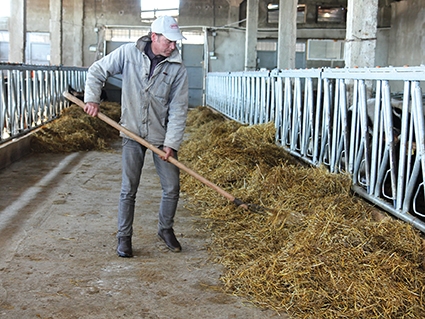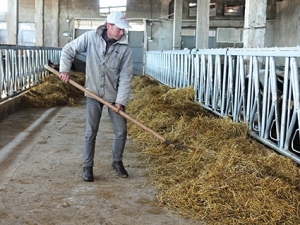SDC Raises Political Commitment of Women & Supports Sustainable Farming
Five years ago, only three percent of women in the regions of Kvemo Kartli, Adjara and Samtshe-Javakheti attended community meetings. By spring 2016, the number of female participants had increased to 27 percent.
This fundamental change was brought about through the launch of 19 Women’s Rooms in the municipalities of the three regions and the accompanying gender training and outreach of their village representatives, who took the message of women’s participation to the villages.
Women’s Rooms are located in municipal buildings where visitors have access to various free services, for example internet, consultation, library, children’s corners and more. They function as a resource center and communal space which aims to help the local population access the local government and its resources, and encourages and increases women’s participation in decision making.
Maia Mosiashvili has been involved in the process since 2012, when the first pilot Women’s Room opened in Tetritskaro in the Kvemo Kartli region. She says that the situation was very different then than it is today:
“The idea was to create an accessible space in municipal buildings, a place where women could get information. We named it the Women’s Room to specially encourage women to use the services. But, of course, men are allowed to use the services, too. At the moment 40% of visitors to Women’s Rooms are men.”
Between 2013 and 2016, almost 13,000 services were provided by the 19 Women’s Rooms. The most popular service is the free internet, followed by the consultations. Libraries and the children’s corners are less popular, but still more than 4,000 people have made use of them.
Increasing access and the involvement of women in local governance is only one aim of Women’s Rooms. Another aim is to support them improve their livelihoods. One example of this is by starting their own businesses. Regular business trainings are provided by some municipal Women’s Rooms to teach rural women how to write a business plan and to start their own business. “They motivate and facilitate women in rural areas to become entrepreneurs,” says Mosiashvili.
As the Women’s Rooms are financed by the municipalities, it is a good example of successful development cooperation. Financial help was only needed in the beginning when start-up funding for renovating and equipping the designated spaces inside the municipal buildings was provided by the Swiss Agency for Development and Cooperation (SDC) and later by USAID. The sustainability of the funding through the ownership of the municipalities was built purposefully into the design.
Women’s Rooms are part of the SDC-funded and Mercy Corps-implemented Alliances Lesser Caucasus Programme (ALCP) support to rural inhabitants, most of whom are dependent on livestock. Access to the resources of local government is an important part of their lives. Through the ALCP, the SDC is also supporting a wide variety of initiatives through the private sector and civil society to benefit farmers in the dairy, meat and honey sectors. These include the construction of an Alpine Botanical garden at the top of Goderdzi Pass to attract tourists to rural Adjara and to enable the local population to benefit from their environment.
Initiatives for sustainable farming
The SDC-financed projects for agriculture development in Georgia have contributed to increasing the incomes of 83,500 farmer households in the last four years, on average by 27 percent.
Among these projects, the Rural Economic Development Program (RED) is working on different initiatives to improve the quality and quantity of meat, milk, cheese and potato production in Georgia. It supports the development of stable business relationships between farmers and wholesalers.
The RED supports, for instance, a model farm in Kvemo Kartli to provide technical assistance to dairy value chain actors. This farm has three main directions: (1) it introduced modern animal husbandry and milk production technologies to ensure the high quality and safety of the milk produced; (2) it introduced modern technologies of feed production which reduces production costs and thereby ensures profitable winter milk production; (3) it strengthened long-term relations between milk sellers and buyers, also improving dairy product marketing by ensuring the continuous supply of an increased variety of dairy products.
Furthermore, the RED supported cheese-factories to meet food safety requirements. Farmers sell their milk to the factory which processes it into cheese and sells it to supermarkets in Tbilisi. It provides sustainable market access to farmers, and facilitates cheese production on their own in compliance with food safety requirements.
Similar interventions were undertaken to increase the efficiency in the potato value chain. Upgrading potato storage facilities enables farmers to reduce their losses, which used to amount up to 30%. In addition, the store is used for information exchange and trainings where regular courses take place about potato growing and storage technologies.
Modernization of vocational education nationwide
Modernization of the vocational education and training (VET) system in agriculture is the objective of the nationwide project financed by the SDC and implemented by UNDP Georgia. The previous system was primarily theoretical, providing the students with limited or no practical training on the job. With this project, Switzerland supports the Georgian Government to introduce and root the dual system of vocational education and training that offers local farmers both upgraded theoretical knowledge and practical skills in their field. Flexible modular training and work-based learning programs were developed and piloted to make VET attractive for young people.
These projects are only a part of the work of the SDC in Georgia. If you would like to learn more about SDC’s strategy and their previous experiences in Georgia, read the interview with the Regional Director of the Swiss Cooperation Office for the South Caucasus, Mr. Olivier Bürki, in next Tuesday’s Georgia Today Business.
Manuela Kosch












